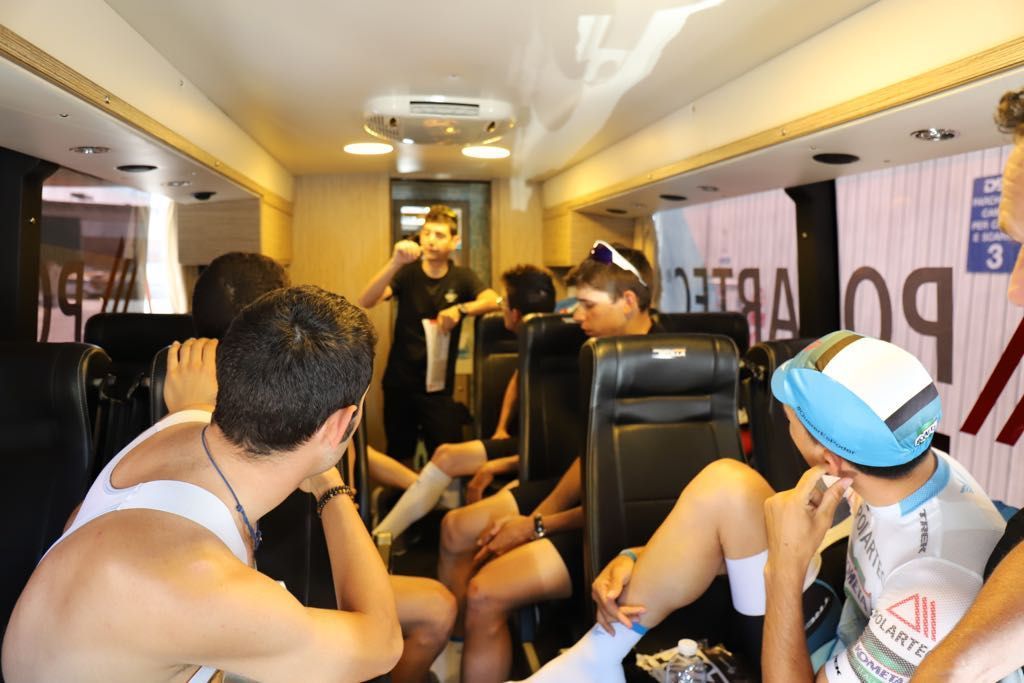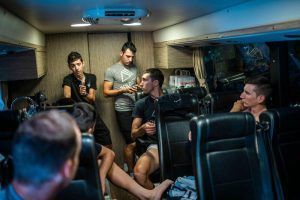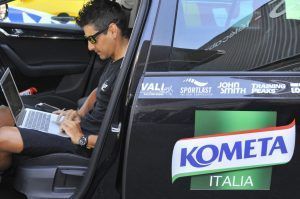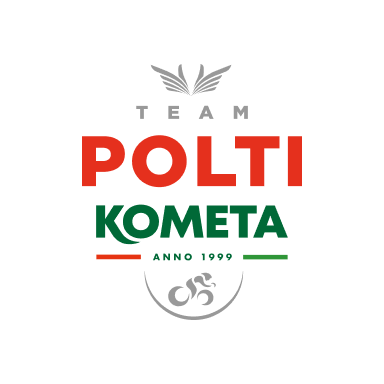Jesús Hernández: “People congratulate us, Polartec-Kometa has given a very good image all season”

After fourteen years as a professional rider, with five teams in the curriculum and many adventures, this season Jesus Hernandez (1981) changed his role to be the sport director of the new Polartec-Kometa continental. Without pause, from the handlebars to the car. And no time for homesickness. “Do I miss the bike? It’s a question I’ve been asked a million times this year,” he smiles. “Not really, I don’t miss it. I quit cycling when I wanted to, and I really want to take charge of a new project, which I like and which motivates me. I love my work. I do the whole calendar! I love this life, travelling, being in the races, being with the runners… I don’t miss the bike. I enjoy it, I continue riding, but without obligations. I haven’t gained weight and if I can I won’t catch it!”.
A novel director for a novel project…
It has been a great year. We have an outstanding, magnificent working group. At all levels. I have gone from being fourteen years directed to being me the one who directs and organizes; in that, in the management, I was more lost at the beginning; it is what perhaps has cost me more. In the first weeks of the project’s life I told everyone to be patient with me, that I was also new, that I was also learning, that of course I could also be wrong… And having people at your side with more experience who give you good advice, like Félix García Casas, always helps.
The fact that you were a professional cyclist until last year gives you an empathy with the riders that is very valuable, very important, very necessary…
 From the car, it’s true, everything looks easier. Before some situations of race, before speaking, I remembered the particularities of some moments… You understand when a rider tells you that he has not been able more, that he was empty, that he did not have his day… Also in the opposite direction, with a look you would believe if he tells you a ‘milonga’. This is not the case. The good thing about working with young people is that they are sponges, they listen to you… What are you going to tell a WorldTour rider! What are you going to teach him! Nothing. We had a great group, who always did what I asked them to do. There hasn’t been a day when they haven’t done it, it’s another thing that they walked more or less.
From the car, it’s true, everything looks easier. Before some situations of race, before speaking, I remembered the particularities of some moments… You understand when a rider tells you that he has not been able more, that he was empty, that he did not have his day… Also in the opposite direction, with a look you would believe if he tells you a ‘milonga’. This is not the case. The good thing about working with young people is that they are sponges, they listen to you… What are you going to tell a WorldTour rider! What are you going to teach him! Nothing. We had a great group, who always did what I asked them to do. There hasn’t been a day when they haven’t done it, it’s another thing that they walked more or less.
After the Movistar Team WorldTour, the continental Polartec-Kometa is the second Spanish team with the most victories of the season, with ten. What is your assessment of this first year?
To evaluate the season, I think we have to compare ourselves with other continental teams of our level and with our philosophy. Teams with young riders, with an average age of 21 or 22… In this sense we are very happy. And above all for the image. Beyond the victories, for the image. It is clear that triumphs help a lot in terms of the team’s external image. But many days could not be won, in races like in Burgos or Hungary, and yet has left a great image. A big team image. It’s something I value, and that’s what I’m staying with. People speak very well of the team beyond the victories of Matteo Moschetti or Kevin Inkelaar; they do it for its image, for its seriousness, for the fact that it is not a team that runs scattered each one to its roll on one side of the pack, no. It’s a team that runs with a great image; It’s a team that runs together, with that discipline that we try to transmit to them… That the kids, when they jump into the WorldTour, know what discipline is like in a big team, the fact that you have to be in front, that you have to ride together, that you have to comply with the team’s orders and that your role can vary depending on the stage… People congratulate us; the team has had a very good image from the outside throughout the season.
But the importance of the results, especially the media, ends up being undeniable…
 Yes, of course, and we live from the results. It’s true. The first ones are asked by the sponsors and I am the first one as the director. But many times a good image on television, or facing the outside, is also worth more than a victory. Winning is very difficult. It’s not so much a question of attitude, it’s luck. Many times we have not won when it was very feasible, why not. The last day in the Tour of Hungary, for example, Matteo had it very well and a crash near the finish line conditioned the sprint… Of the 200 that come out only one wins. And every day things happen, unforeseen things that you don’t control… More than victories, which is also true that they help, as I said before, I keep the image.
Yes, of course, and we live from the results. It’s true. The first ones are asked by the sponsors and I am the first one as the director. But many times a good image on television, or facing the outside, is also worth more than a victory. Winning is very difficult. It’s not so much a question of attitude, it’s luck. Many times we have not won when it was very feasible, why not. The last day in the Tour of Hungary, for example, Matteo had it very well and a crash near the finish line conditioned the sprint… Of the 200 that come out only one wins. And every day things happen, unforeseen things that you don’t control… More than victories, which is also true that they help, as I said before, I keep the image.
From competing in the WorldTour to being continental director… How do you see cycling with that amalgam of sporting structures that cohabit at different levels? With that disparity, that coexistence between different structures in some races that, from the point of view of a continental team, can condition a performance, forces you to adapt to a way of running imposed by the strongest…?
Before competing, the first thing I do is to see the level of the race. If there are WorldTour teams, I already know what role I’m going to play in the race. If there aren’t, it will be totally different. If there are, the goal is to be seen. If not, go out and win. We have been lucky as it was won in the Vuelta a Burgos. A wonderful day. But it’s not normal. The normal thing is to let yourself be seen, to look for leaks, to dispute the secondary classifications,… And in this sense I think that when your team is very young you have to balance the calendar, as we have done this year. Go to races with WorldTour as well as without WorldTour. Because we have young people who also need to race, go out to win, not just go to a test to look for an escape. Running with WorldTour is very good for kids to see the level that there really is. It doesn’t always have to be either.
A positive alternation…
That’s right. If you only race with continental, you won’t see the reality of what it’s like to race with professionals, the WorldTour calendar. People like Matteo Moschetti have already seen that in a race like Burgos he can beat WorldTour cyclists, and that’s positive for him. Young people who were in Burgos, like Juanpe, have already seen how it goes, that any WorldTour rider will probably be one of the most riders in a continental team. It’s all very well for them to also be aware that they can’t relax. A continental team is a step, it’s not a goal, it never can be. They have to see that there is a level higher than theirs. If we were to focus on a continental calendar many would think that they have already reached their goal. And no. They have to be aware of that higher level and their ambition must be to get there. This, in that sense, is a passing team.
… For now.
Yes, of course, for now (smiles). But it’s very good that they see and are aware of that idea, the idea of the passing team. And that they’re not as good as they think they are yet. Let the idea be understood: the worst of another team walks more than you. That’s why this alternation of tests is positive. The first one as director I like to go out and say to them in the meeting of the bus: we are going to fight to win. But also running with Valverde, with Froome…
What was the best moment of the season?
I think that the first victory, in Turkey, unexpectedly, Matteo did not arrive well to that race, the team was a newborn… And of course the stage victory in Burgos. To win in Burgos… buf! I always tell them that you have to work to win, but it’s very difficult. When they confirmed on the radio that Moschetti had won in Castrojeriz, they even made me want to cry with joy. Nobody expected it!
Although you are a very positive person, there will also have been some ‘worst’ moment, some negative moment…
Negative, no, none. Maybe… yes, I will be left with a bad taste in my mouth. He didn’t win a stage in the Giro Baby with Matteo, where we were close but he got sick and had to give up just with a stage ahead that was great for him, after having been close days ago and even having done a second one day. In the Giro we were very active every day, a fantastic image, being the protagonists every day,… In the car I said to my second ‘there has not been a day in which we have not been mentioned by radio’. Not a day. That’s a positive thing. And more so in a race like the Giro Baby. But he didn’t win that stage… and maybe it’s the one I can get out of him, but not disappointment.
Can we confirm any of the events on the calendar?
As director I want to balance continental races and WorldTour races. And also if I would like to do some more tests in Spain, with WorldTour, appointments not extremely demanding, with good level …. But we are going to keep maintaining big goals like the Giro de Aosta, the Giro Baby or the Tour of Hungary, which are achievable, realistic, very important goals… And whatever comes, welcome. We have riders with an average age of 20, 21 years, who one day can be in front with WorldTour, but it’s not normal that it’s like that or every day … I would love to go and beat WorldTour teams. For me it would be the easiest thing, that calendar, but at the level of results we would not have anything. And at formative level would not be the best.
Does Trek-Segafredo, a team of which Polartec-Kometa is part of development training, impose any kind of calendar?
No, we only talked about the USA at the time if the team couldn’t go for example to the Tour of Utah… There is no calendar that has told us ‘do this test or that one’, but I know that Luca Guercilena likes us to be in Aosta or in the Giro, because they are beautiful races, hard, where there is a great level. There you can see a lot of things.
To speak of two proper names. Looking ahead to 2019, Matteo Moschetti jumps to the WorldTour, who has signed nine of the team’s ten victories, and stays after being stagiaire in the final stretch of the Stefano Oldani course…
Matteo, besides being a great kid, is an incredible rider. It has been a pleasure to have him on the team and I’m sure things will go very well for him. Oldani is a very interesting rider: he’s very fast, he’s very brave, he rides the bike very well… He joined the team again and quickly became Matteo’s last man, as they knew each other from Colpack. Very skillful, he defends himself only in the pack. He’s very fast, although he’s not a pure sprinter. He has a brave attitude, he wants to please, he is a rider who can solve many days for us. He’s going to be a very important part of the team.
(automatic traslation, sorry for mistakes)


































